
apo
APO is a comprehensive observability platform combining OpenTelemetry with eBPF. Leveraging LLM to enable automated analysis and troubleshooting 🚀.
Stars: 277
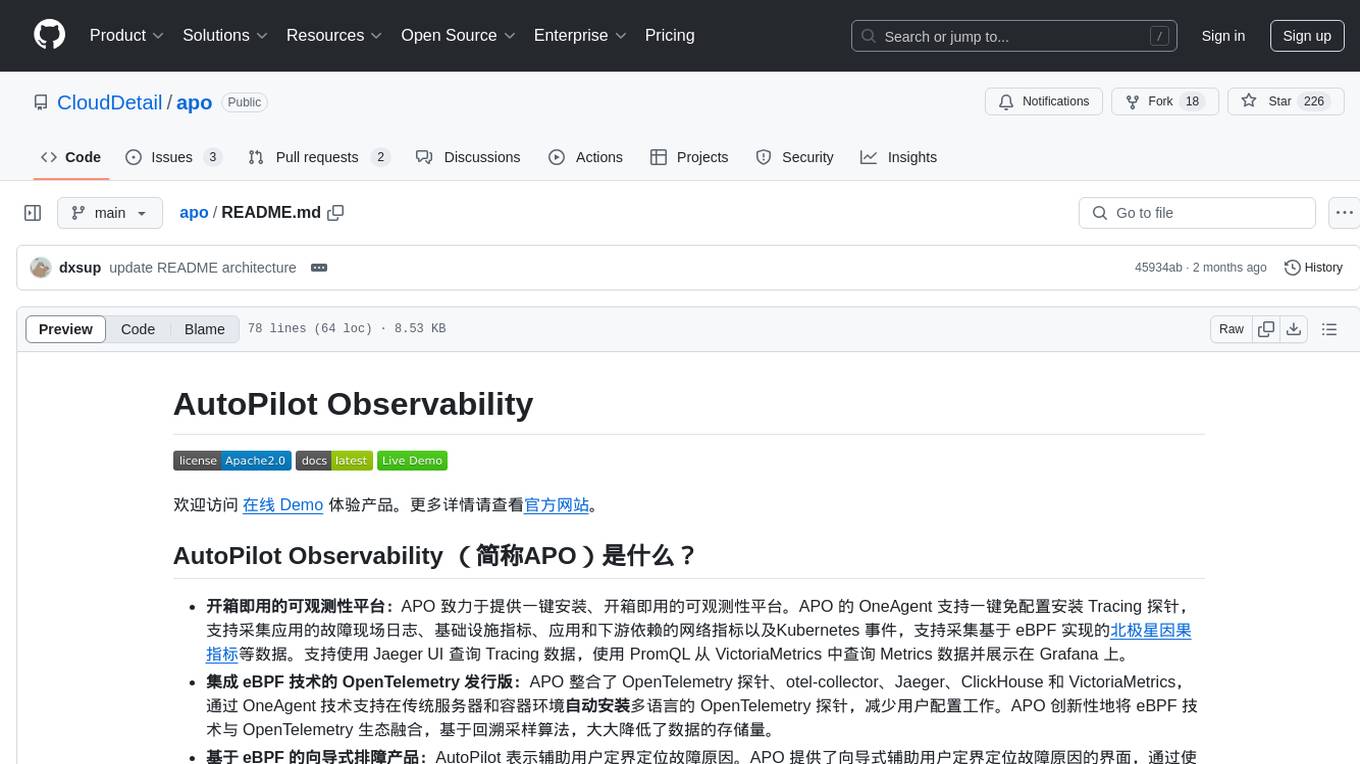
AutoPilot Observability (APO) is an out-of-the-box observability platform that provides one-click installation and ready-to-use capabilities. APO's OneAgent supports one-click configuration-free installation of Tracing probes, collects application fault scene logs, infrastructure metrics, network metrics of applications and downstream dependencies, and Kubernetes events. It supports collecting causality metrics based on eBPF implementation. APO integrates OpenTelemetry probes, otel-collector, Jaeger, ClickHouse, and VictoriaMetrics, reducing user configuration work. APO innovatively integrates eBPF technology with the OpenTelemetry ecosystem, significantly reducing data storage volume. It offers guided troubleshooting using eBPF technology to assist users in pinpointing fault causes on a single page.
README:
Visit autopilotobservability.com for more details.
APO (AutoPilot Observability) redefines modern observability by seamlessly combining AI and deep system insights. Powered by state-of-the-art Large Language Models (LLMs), APO empowers teams to decode complex system behaviors, rapidly pinpoint root causes, and automate diagnostic workflows. APO’s AI agentic workflows with designed data plane put you in control, enabling custom automated diagnostics that fit your unique needs.
APO display the following Highlights:
- Agentic Workflows for Observability: Low-code orchestration that transforms your expertise into the dynamic core powering the intelligent agents.
- LLM-native data plane: Designed data plane for LLM and deeply integrated with AI Agent.
- Seamless Data Source Integration: Supports frictionless connection to existing data sources, empowering users to leverage our revolutionary data plane without any system modifications.
- Full-Stack Coverage: Monitor logs, traces, and metrics seamlessly across your entire technology stack for comprehensive observability.
- 10X Cost-Effective: Save operational costs through streamlined processes, intelligent data handling, and efficient resource allocation.
Low-code orchestration that transforms your expertise into the dynamic core powering the intelligent agents.
- Design personalized AI agent for observability.
- Build troubleshooting workflows with guided experience.
- Customize automated diagnostic workflows.
- Experience advanced cross-domain data correlation.
APO comes with a variety of built-in intelligent workflows. You can customize your own workflows with your expertise to enable automated troubleshooting and intelligent operations.
APO has integrated expert knowledge into its workflows, with "Alert Events" featuring two deeply integrated workflows: Alert Validity Analysis and Root Cause Analysis. These workflows automatically analyze alert causes and reduce the workload of alert handling.
-
Alert Validity Analysis Workflow: This workflow helps you identify which alerts require immediate attention among numerous notifications. With its assistance, you can quickly focus on critical alerts. Additionally, you can design more sensitive alert rules to gather more context information when incidents occur, which will aid in subsequent troubleshooting.
-
Root Cause Analysis Workflow: When an alert is received, this workflow automatically retrieves alert context, such as related hosts, services, or pods, searches their metrics and anomalies, and conducts comprehensive root cause analysis using Polaris metrics to help you resolve incidents faster.
All built-in workflows can be modified according to your specific needs and scenarios.
Given the abundance of multi-model data in the observability domain, APO provides a suite of data query and anomaly detection tools that everyone can simply drag and drop to use.
To prevent unverifiable results caused by large model hallucinations, we offer visual data charts during workflow execution. You can view execution results and data charts at every step. Additionally, cross-validation with eBPF Polaris metrics and multi-source metrics further enhances result reliability.

- API-centric service map: APO provides granular visibility into API endpoints within applications, creating clear service dependency maps for specific business flows. Our intelligent similarity algorithms prevent topology sprawl by condensing similar nodes while preserving detailed information in tabular views. Navigate effortlessly between node details with intuitive click-through navigation.
- Anomaly events with cross-domain data correlation: Anomaly events with cross-domain data correlation: Given that observability data is diverse in structure and massive in scale, directly feeding it into large models is impractical. APO’s innovative approach transforms varied data into anomaly events, correlating them with the service map while capturing essential contextual details. This enriched data stream enables precise anomaly detection and cross-domain correlation, empowering the system to uncover subtle issues and deliver deeper, actionable insights.
With OneAgent technology, APO supports the automatic instrumentation of multi-language OpenTelemetry agents across traditional and containerized environments, eliminating manual configuration overhead.
Experience complete visibility with APO's unified platform, bringing together traces, metrics, logs, and events in one cohesive view.
APO's intelligent correlation of delay patterns, error rates, and log anomalies quickly surfaces relevant time windows for detailed investigation through logs and traces.
| Traditional Observability Tools | APO |
|---|---|
| Data overload and manual analysis | Simplified, actionable insights |
| Limited automation and customization | Fully customizable, automated workflows |
| Complicated agent installatioin | Zero-touch tracing agent Instrumentation |
| Black-box AIOps with poor explainability | Transparent, explainable recommendations |
| Vendor lock-in | Open source and extensible design |
Begin your journey with APO here.
Explore our comprehensive guides here.
APO is open source, and we welcome contributions! Whether it’s fixing bugs, adding new features, or improving documentation, your input is valuable. Here’s how you can contribute:
- Fork the repository.
- Create a feature branch.
- Commit your changes and push.
- Submit a pull request with detailed explanations.
APO is licensed under the Apache-2.0 License.
Join the growing community of developers and engineers transforming observability with APO. Connect with us:
- Slack: Join our Slack
- Github: GitHub
Ready to transform your observability? Start with APO today! 🚀
For Tasks:
Click tags to check more tools for each tasksFor Jobs:
Alternative AI tools for apo
Similar Open Source Tools

apo
AutoPilot Observability (APO) is an out-of-the-box observability platform that provides one-click installation and ready-to-use capabilities. APO's OneAgent supports one-click configuration-free installation of Tracing probes, collects application fault scene logs, infrastructure metrics, network metrics of applications and downstream dependencies, and Kubernetes events. It supports collecting causality metrics based on eBPF implementation. APO integrates OpenTelemetry probes, otel-collector, Jaeger, ClickHouse, and VictoriaMetrics, reducing user configuration work. APO innovatively integrates eBPF technology with the OpenTelemetry ecosystem, significantly reducing data storage volume. It offers guided troubleshooting using eBPF technology to assist users in pinpointing fault causes on a single page.
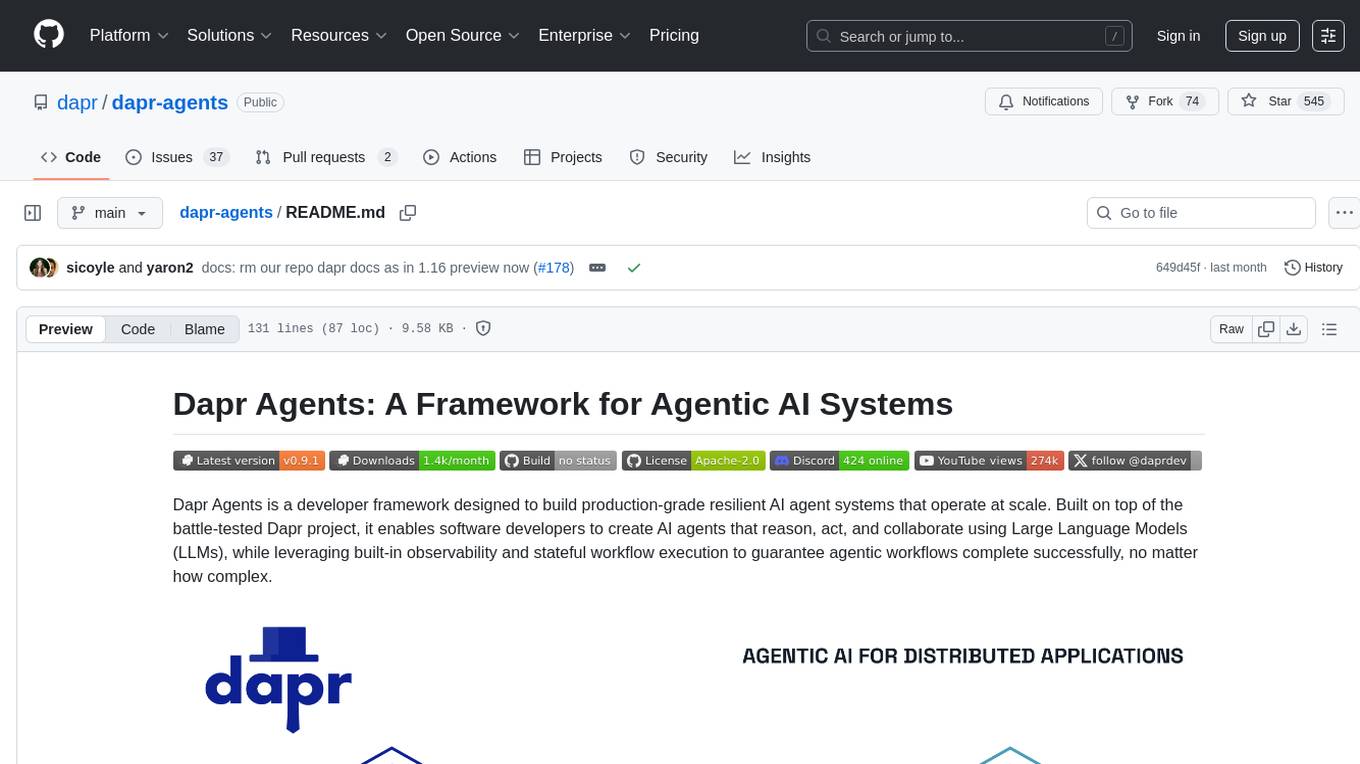
dapr-agents
Dapr Agents is a developer framework for building production-grade resilient AI agent systems that operate at scale. It enables software developers to create AI agents that reason, act, and collaborate using Large Language Models (LLMs), while providing built-in observability and stateful workflow execution to ensure agentic workflows complete successfully. The framework is scalable, efficient, Kubernetes-native, data-driven, secure, observable, vendor-neutral, and open source. It offers features like scalable workflows, cost-effective AI adoption, data-centric AI agents, accelerated development, integrated security and reliability, built-in messaging and state infrastructure, and vendor-neutral and open source support. Dapr Agents is designed to simplify the development of AI applications and workflows by providing a comprehensive API surface and seamless integration with various data sources and services.
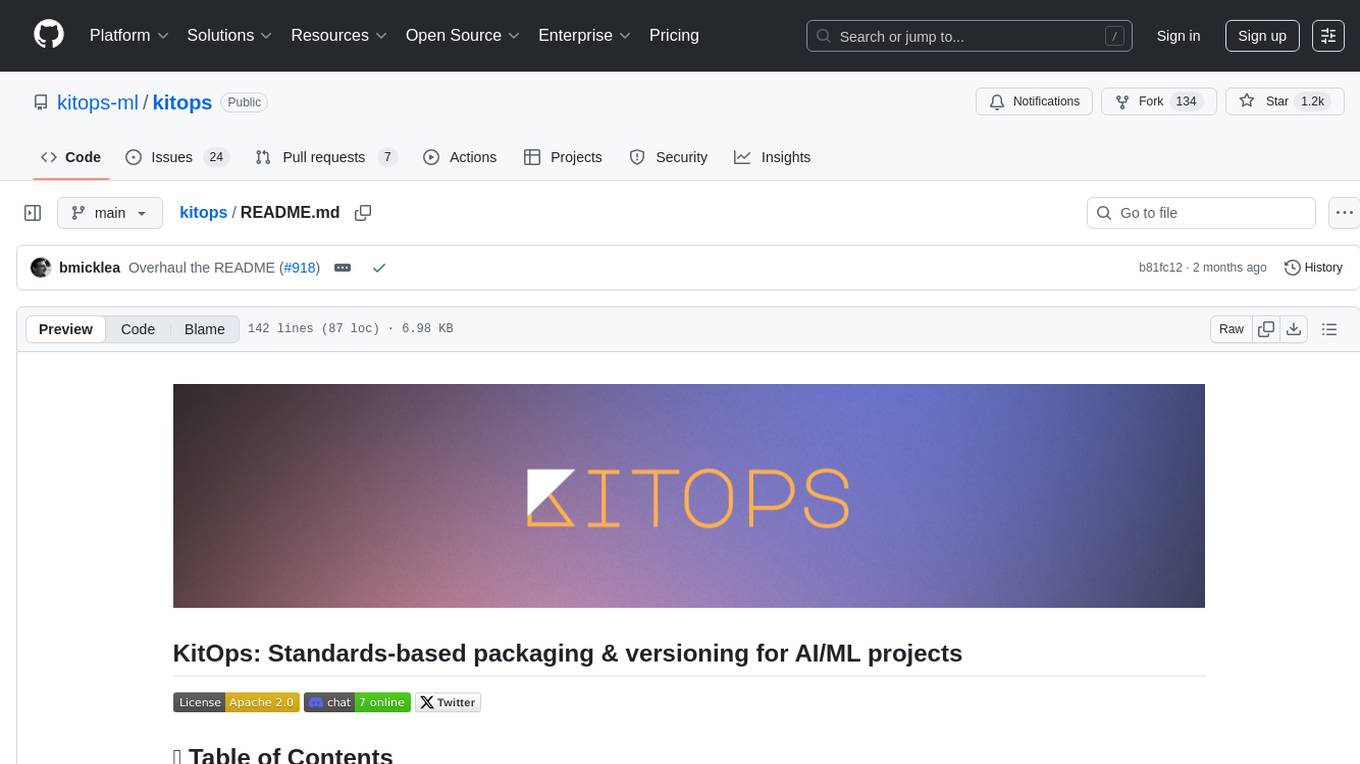
kitops
KitOps is a CNCF open standards project for packaging, versioning, and securely sharing AI/ML projects. It provides a unified solution for packaging, versioning, and managing assets in security-conscious enterprises, governments, and cloud operators. KitOps elevates AI artifacts to first-class, governed assets through ModelKits, which are tamper-proof, signable, and compatible with major container registries. The tool simplifies collaboration between data scientists, developers, and SREs, ensuring reliable and repeatable workflows for both development and operations. KitOps supports packaging for various types of models, including large language models, computer vision models, multi-modal models, predictive models, and audio models. It also facilitates compliance with the EU AI Act by offering tamper-proof, signable, and auditable ModelKits.
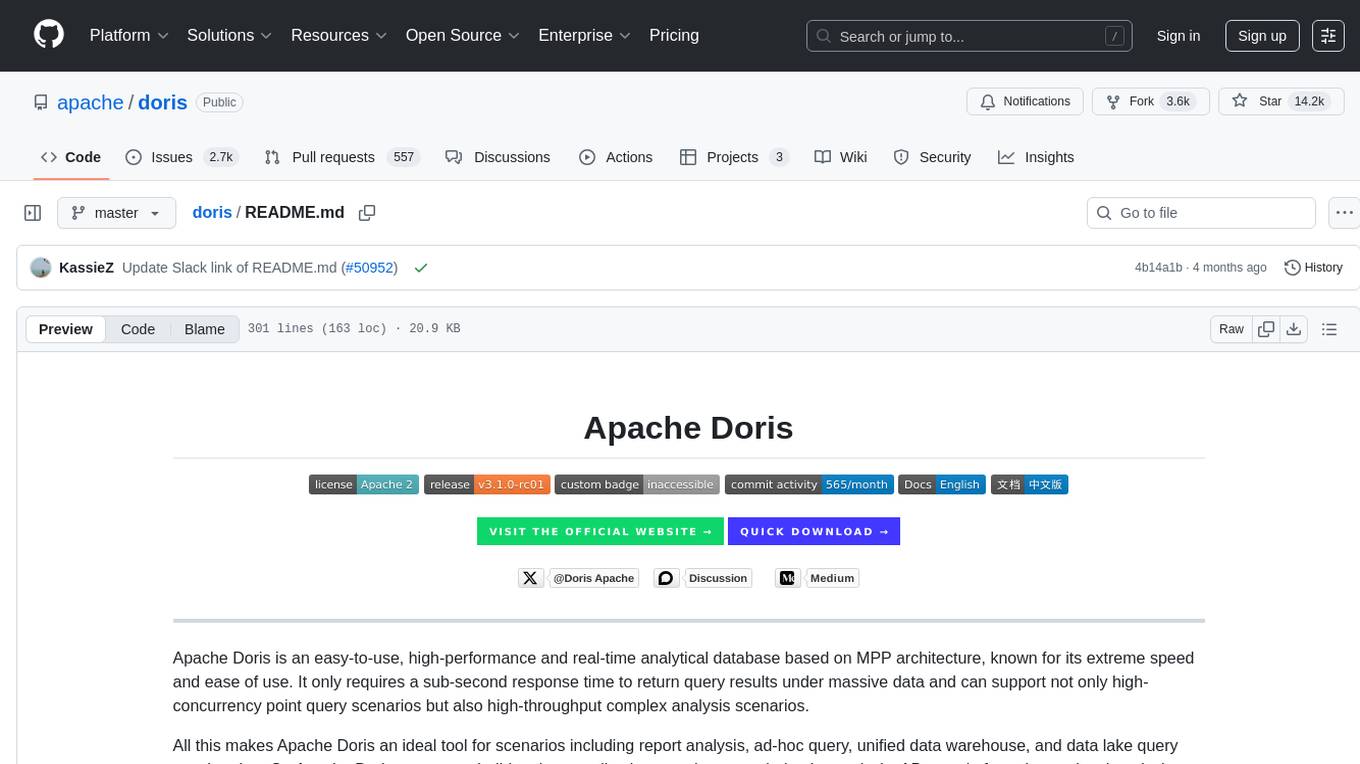
doris
Doris is a lightweight and user-friendly data visualization tool designed for quick and easy exploration of datasets. It provides a simple interface for users to upload their data and generate interactive visualizations without the need for coding. With Doris, users can easily create charts, graphs, and dashboards to analyze and present their data in a visually appealing way. The tool supports various data formats and offers customization options to tailor visualizations to specific needs. Whether you are a data analyst, researcher, or student, Doris simplifies the process of data exploration and presentation.
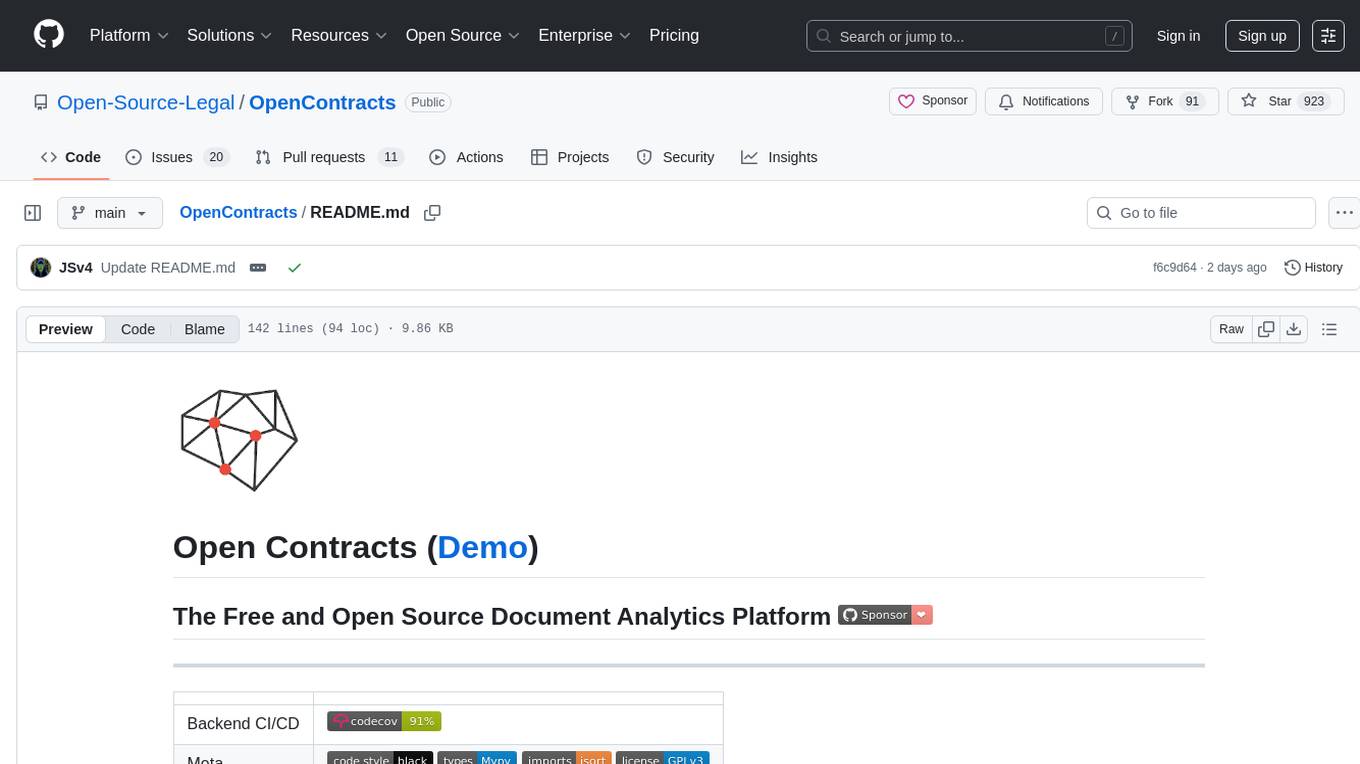
OpenContracts
OpenContracts is a free and open-source document analytics platform designed to empower knowledge owners and subject matter experts. It supports multiple document formats, ingestion pipelines, and custom document analytics tools. Users can manage documents, define metadata schemas, extract layout features, generate vector embeddings, deploy custom analyzers, support new document formats, annotate documents, extract bulk data, and create bespoke data extraction workflows. The tool aims to provide a standardized architecture for analyzing contracts and making data portable, with a focus on PDF and text-based formats. It includes features like document management, layout parsing, pluggable architectures, human annotation interface, and a custom LLM framework for conversation management and real-time streaming.
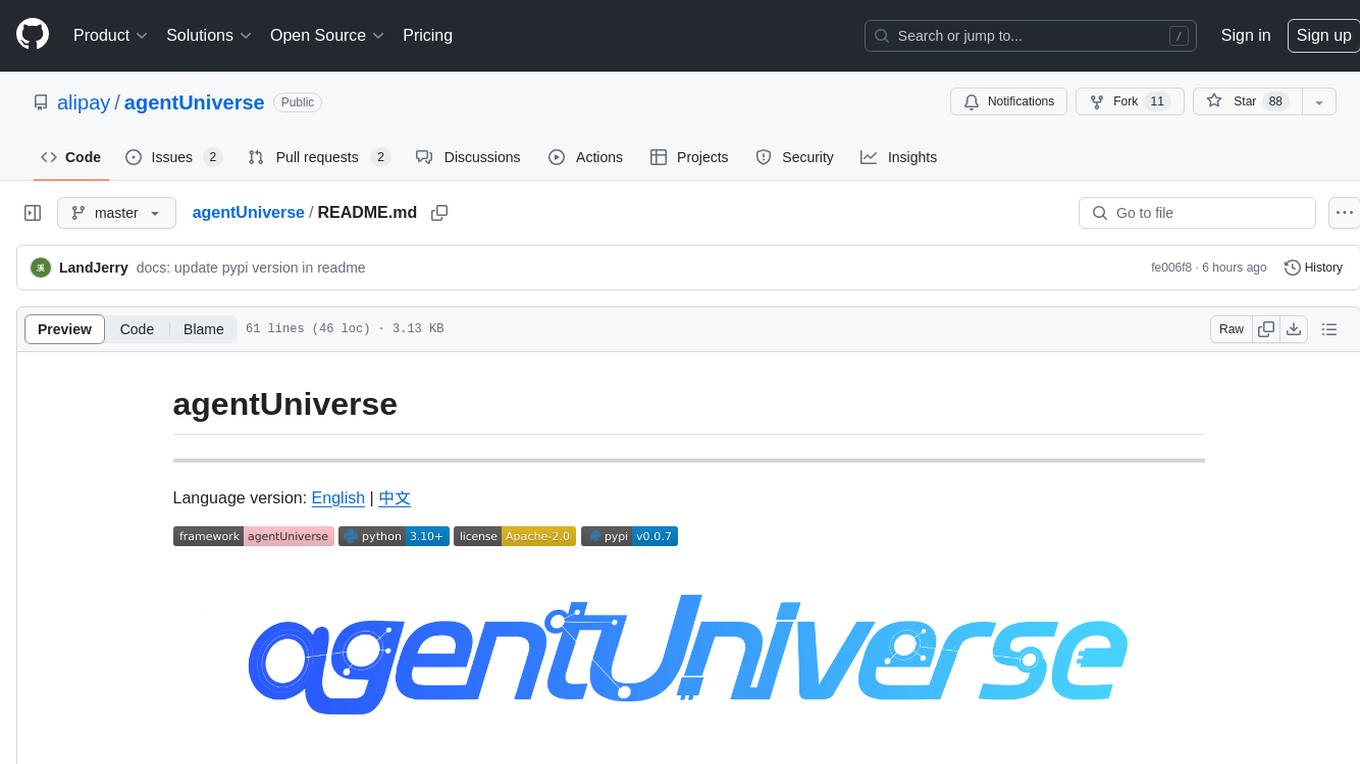
agentUniverse
agentUniverse is a framework for developing applications powered by multi-agent based on large language model. It provides essential components for building single agent and multi-agent collaboration mechanism for customizing collaboration patterns. Developers can easily construct multi-agent applications and share pattern practices from different fields. The framework includes pre-installed collaboration patterns like PEER and DOE for complex task breakdown and data-intensive tasks.
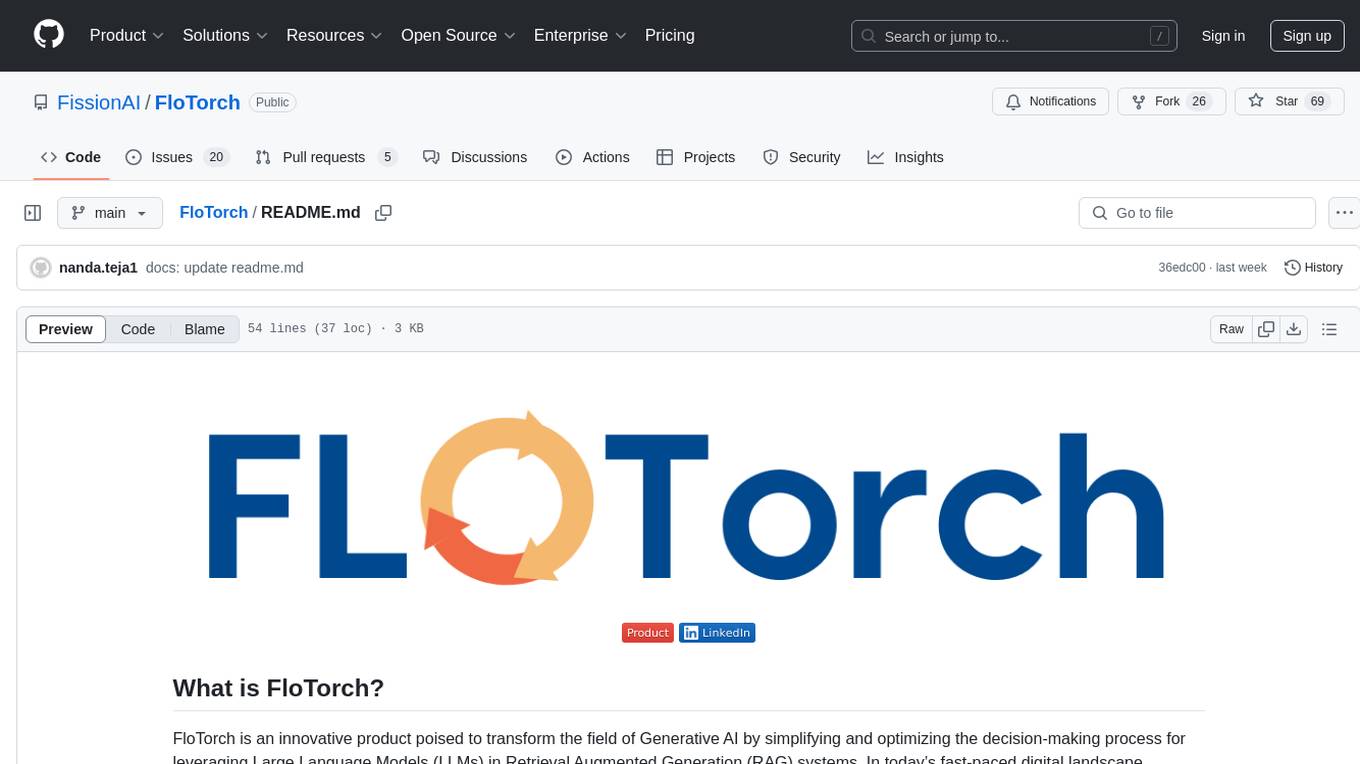
FloTorch
FloTorch is an innovative product designed to simplify and optimize the decision-making process for leveraging Large Language Models (LLMs) in Retrieval Augmented Generation (RAG) systems. It focuses on providing a well-architected framework, maximizing efficiency, eliminating complexity, accelerating selection, and fostering innovation. The tool offers a streamlined, user-friendly approach to help users achieve efficiency, accuracy, and cost-effectiveness in the fast-paced digital landscape of AI.
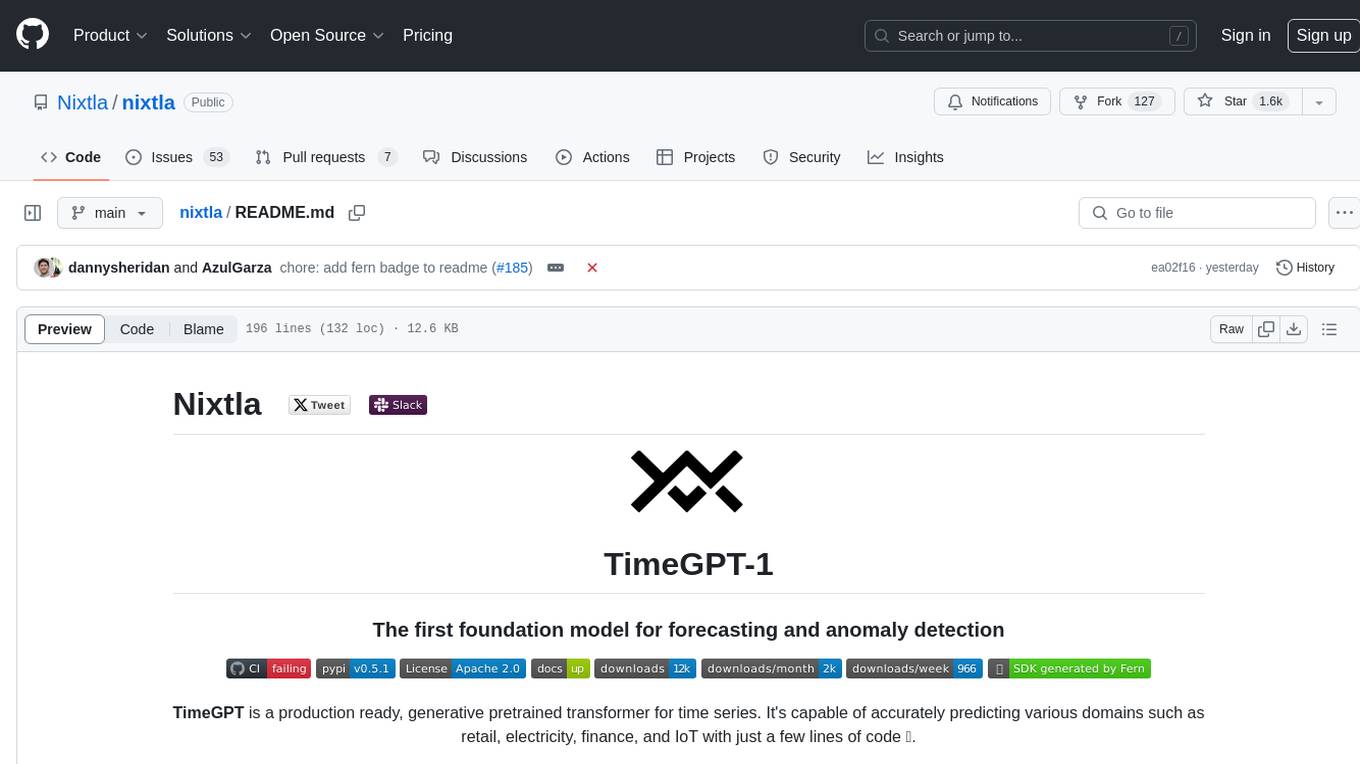
nixtla
Nixtla is a production-ready generative pretrained transformer for time series forecasting and anomaly detection. It can accurately predict various domains such as retail, electricity, finance, and IoT with just a few lines of code. TimeGPT introduces a paradigm shift with its standout performance, efficiency, and simplicity, making it accessible even to users with minimal coding experience. The model is based on self-attention and is independently trained on a vast time series dataset to minimize forecasting error. It offers features like zero-shot inference, fine-tuning, API access, adding exogenous variables, multiple series forecasting, custom loss function, cross-validation, prediction intervals, and handling irregular timestamps.
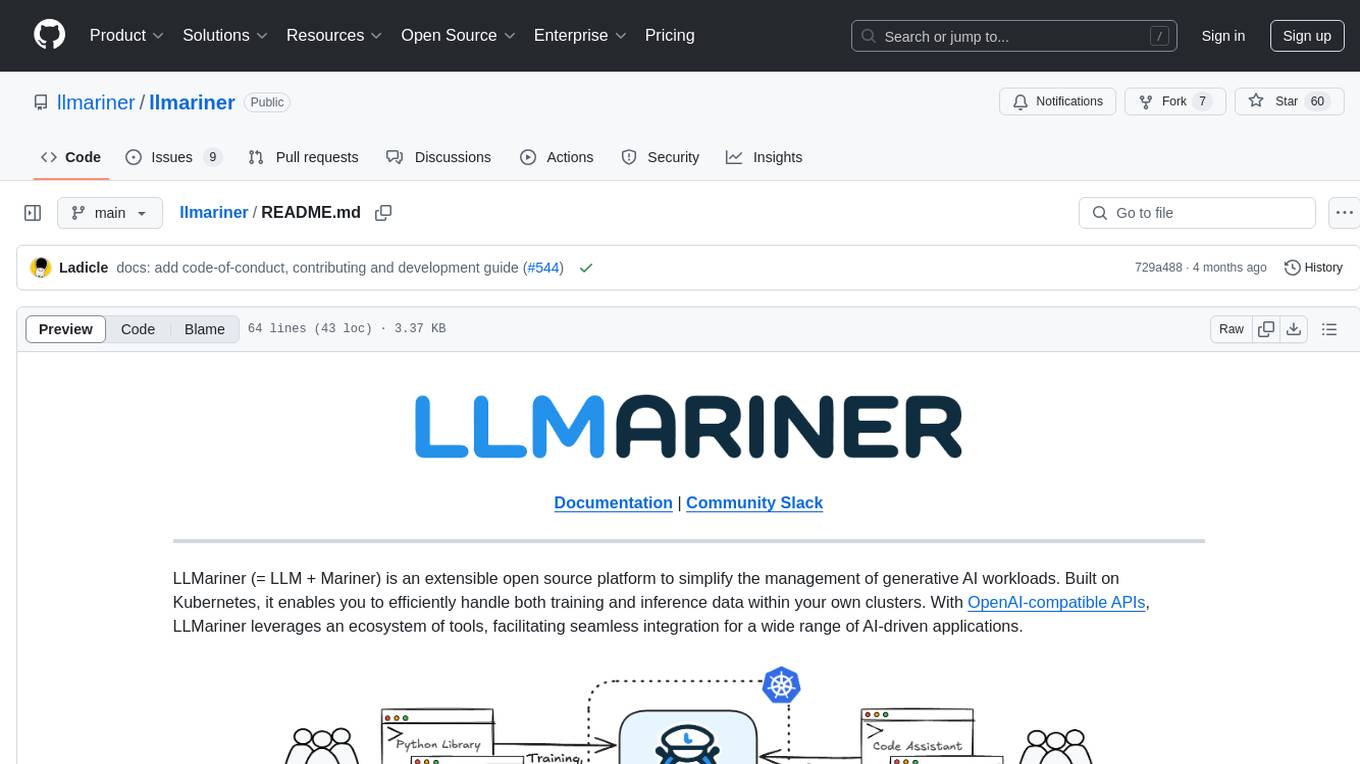
llmariner
LLMariner is an extensible open source platform built on Kubernetes to simplify the management of generative AI workloads. It enables efficient handling of training and inference data within clusters, with OpenAI-compatible APIs for seamless integration with a wide range of AI-driven applications.
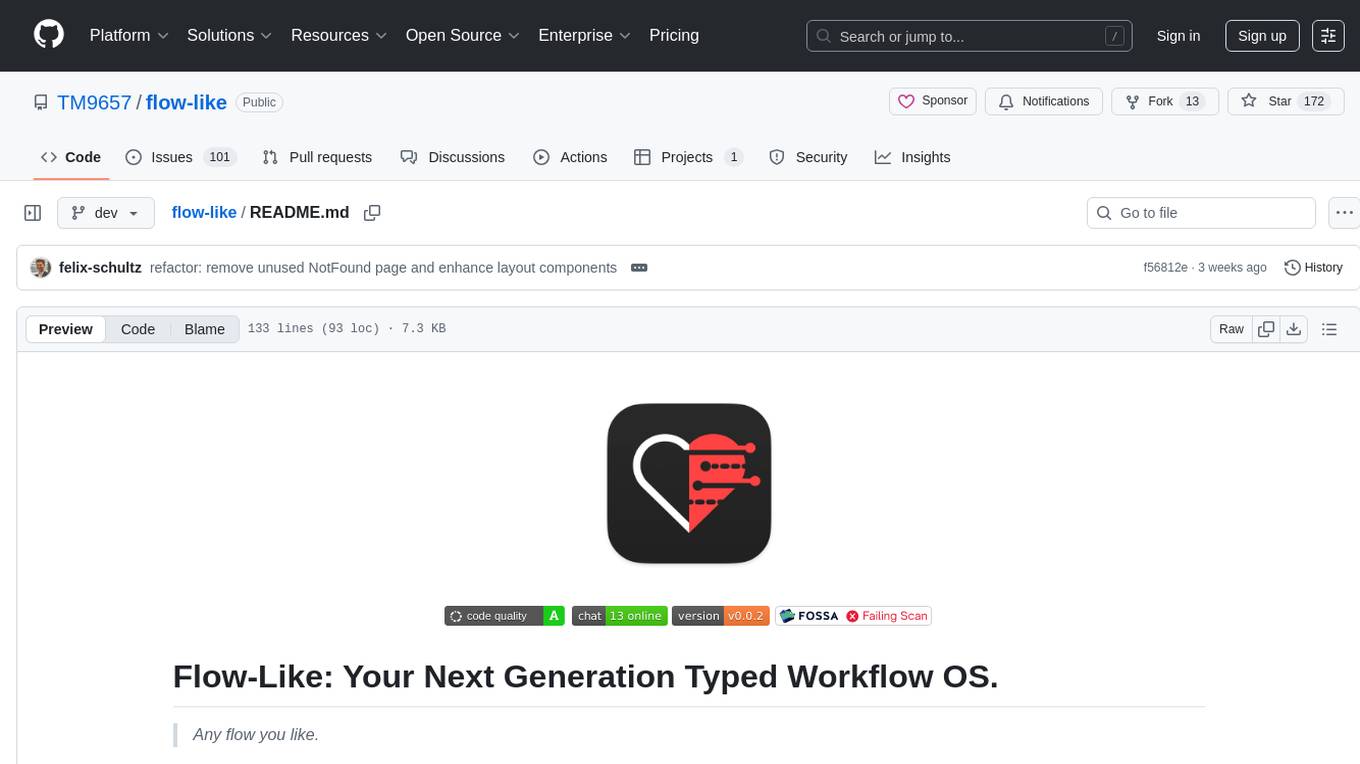
flow-like
Flow-Like is an enterprise-grade workflow operating system built upon Rust for uncompromising performance, efficiency, and code safety. It offers a modular frontend for apps, a rich set of events, a node catalog, a powerful no-code workflow IDE, and tools to manage teams, templates, and projects within organizations. With typed workflows, users can create complex, large-scale workflows with clear data origins, transformations, and contracts. Flow-Like is designed to automate any process through seamless integration of LLM, ML-based, and deterministic decision-making instances.

genkit
Firebase Genkit (beta) is a framework with powerful tooling to help app developers build, test, deploy, and monitor AI-powered features with confidence. Genkit is cloud optimized and code-centric, integrating with many services that have free tiers to get started. It provides unified API for generation, context-aware AI features, evaluation of AI workflow, extensibility with plugins, easy deployment to Firebase or Google Cloud, observability and monitoring with OpenTelemetry, and a developer UI for prototyping and testing AI features locally. Genkit works seamlessly with Firebase or Google Cloud projects through official plugins and templates.
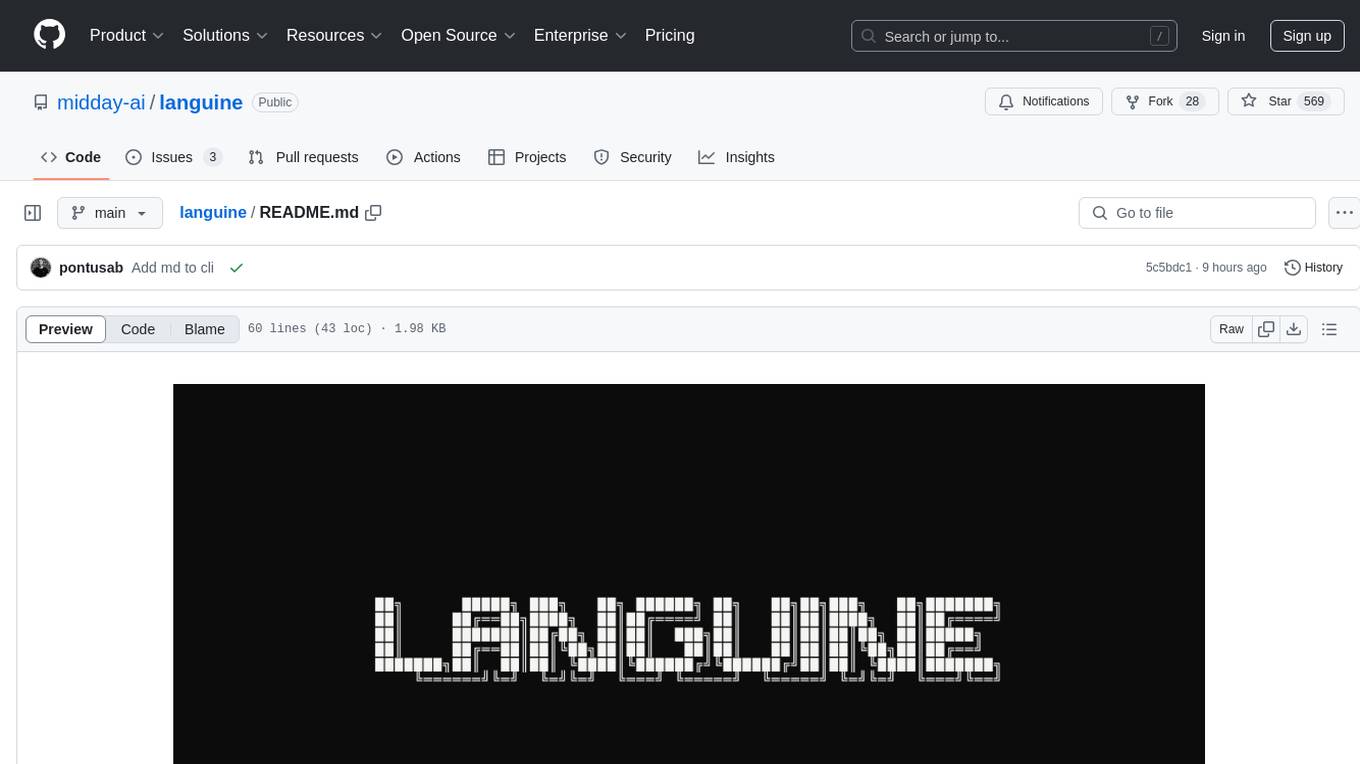
languine
Languine is a CLI tool that helps developers streamline the localization process by providing AI-powered translations, automation features, and developer-centric design. It allows users to easily manage translation files, maintain consistency in tone and style, and save time by automating tasks. With support for over 100 languages and smart detection capabilities, Languine simplifies the localization workflow for developers.
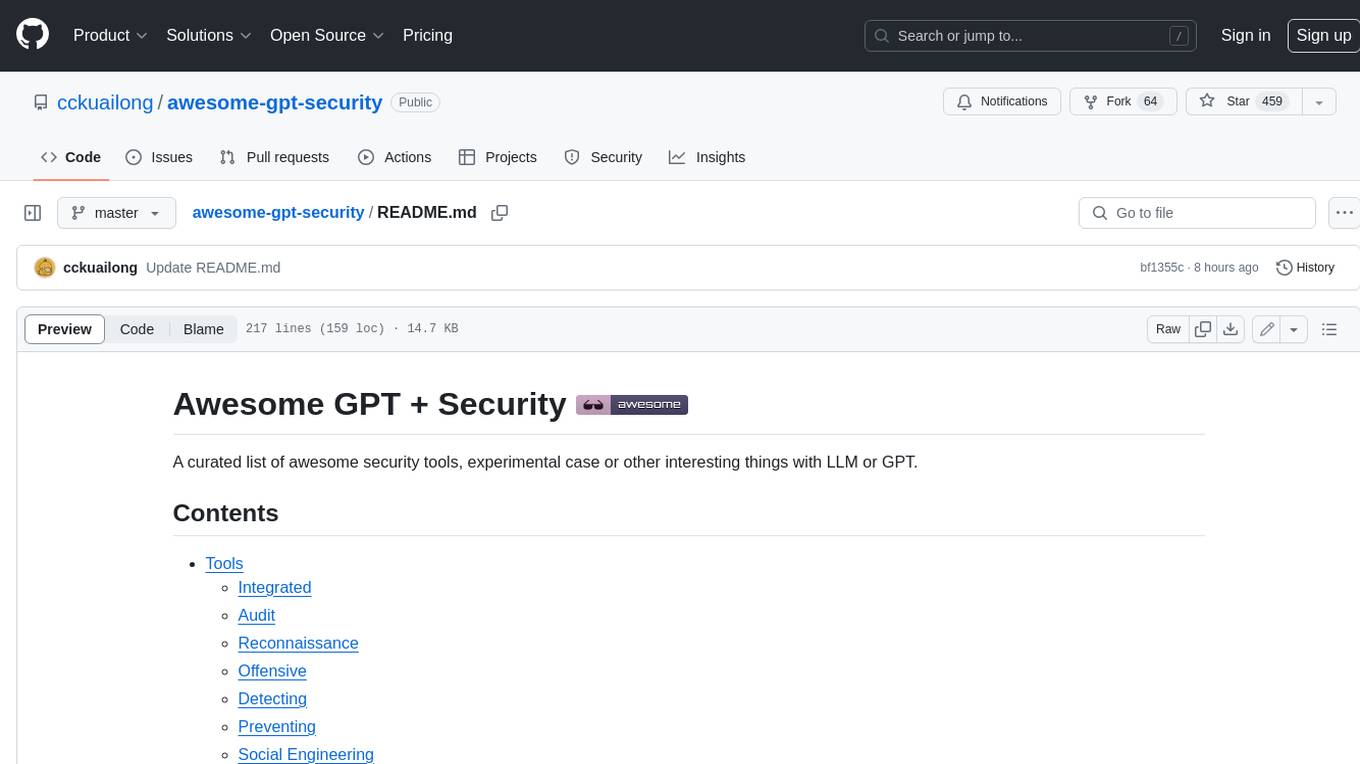
awesome-gpt-security
Awesome GPT + Security is a curated list of awesome security tools, experimental case or other interesting things with LLM or GPT. It includes tools for integrated security, auditing, reconnaissance, offensive security, detecting security issues, preventing security breaches, social engineering, reverse engineering, investigating security incidents, fixing security vulnerabilities, assessing security posture, and more. The list also includes experimental cases, academic research, blogs, and fun projects related to GPT security. Additionally, it provides resources on GPT security standards, bypassing security policies, bug bounty programs, cracking GPT APIs, and plugin security.
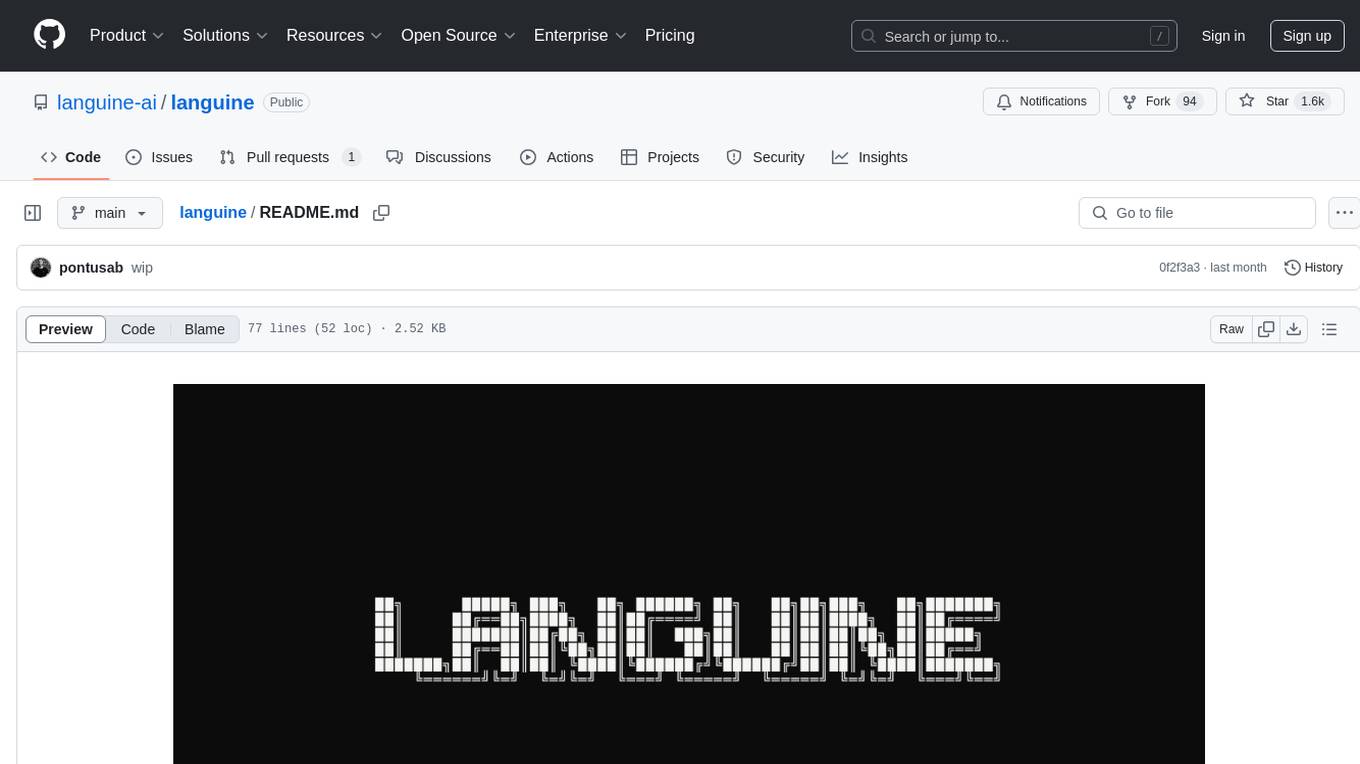
languine
Languine is a CLI tool powered by AI that helps developers streamline the localization process by providing AI-powered translations, automation features, consistent localization, developer-centric design, and time-saving workflows. It automates the identification of translation keys, supports multiple file formats, delivers accurate translations in over 100 languages, aligns translations with the original text's tone and intent, extracts translation keys from codebase, and supports hooks for content formatting with Biome or Prettier. Languine is designed to simplify and enhance the localization experience for developers.
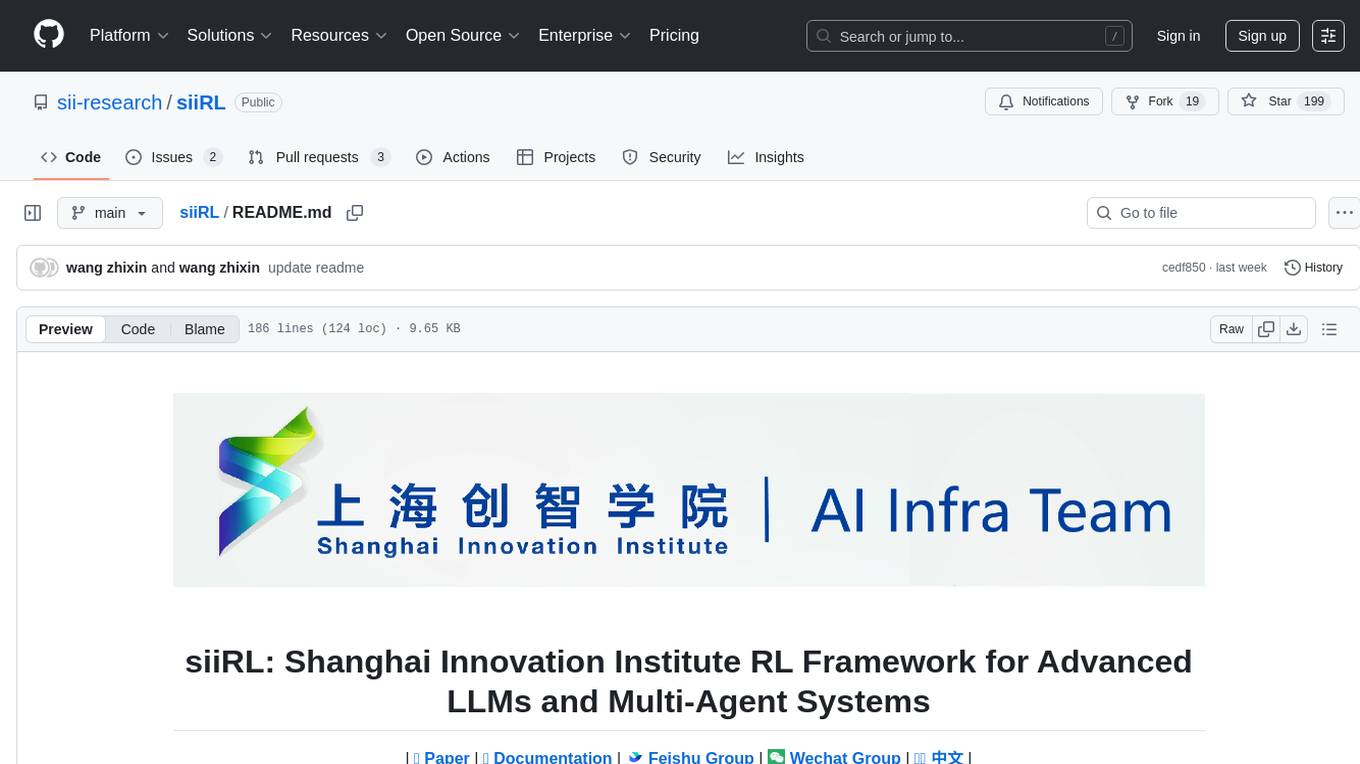
siiRL
siiRL is a novel, fully distributed reinforcement learning (RL) framework designed to break the scaling barriers in Large Language Models (LLMs) post-training. Developed by researchers from Shanghai Innovation Institute, siiRL delivers near-linear scalability, dramatic throughput gains, and unprecedented flexibility for RL-based LLM development. It eliminates the centralized controller common in other frameworks, enabling scalability to thousands of GPUs, achieving state-of-the-art throughput, and supporting cross-hardware compatibility. siiRL is extensively benchmarked and excels in data-intensive workloads such as long-context and multi-modal training.
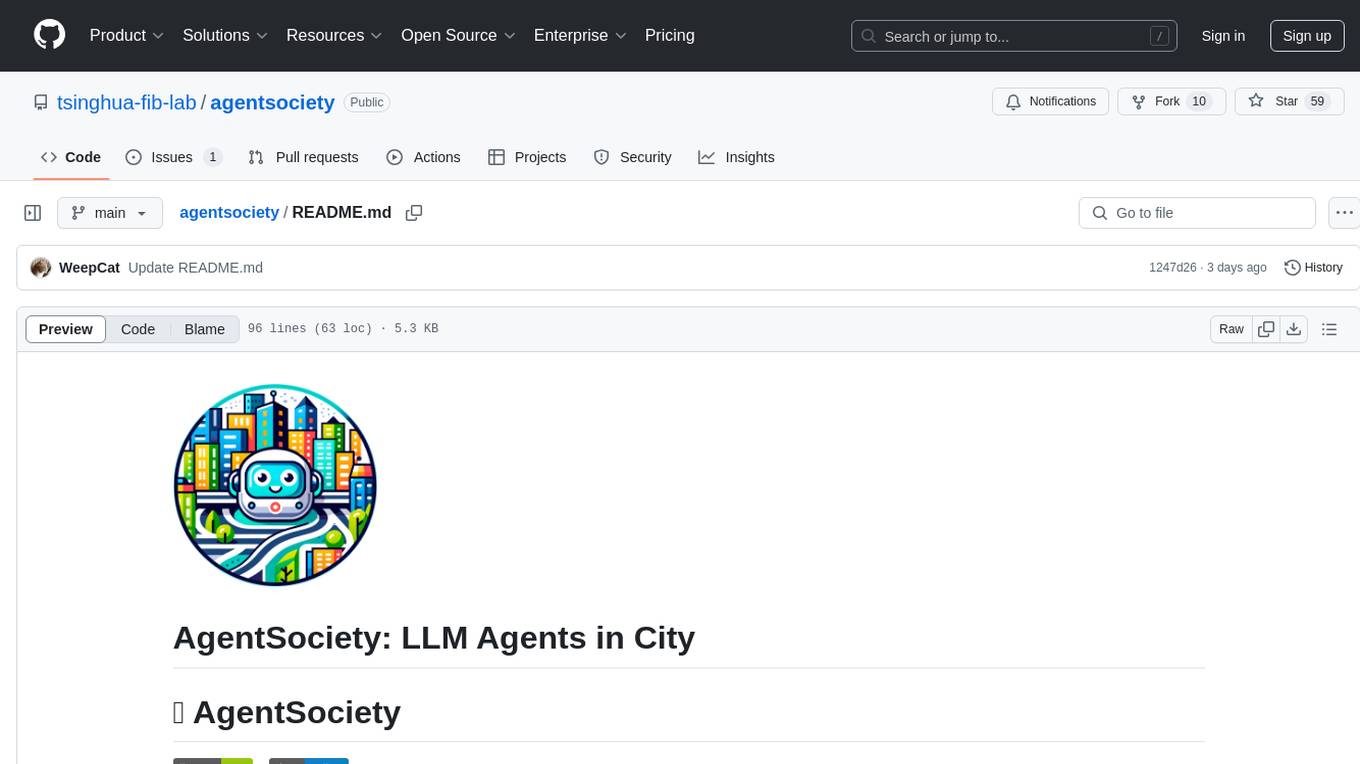
agentsociety
AgentSociety is an advanced framework designed for building agents in urban simulation environments. It integrates LLMs' planning, memory, and reasoning capabilities to generate realistic behaviors. The framework supports dataset-based, text-based, and rule-based environments with interactive visualization. It includes tools for interviews, surveys, interventions, and metric recording tailored for social experimentation.
For similar tasks

apo
AutoPilot Observability (APO) is an out-of-the-box observability platform that provides one-click installation and ready-to-use capabilities. APO's OneAgent supports one-click configuration-free installation of Tracing probes, collects application fault scene logs, infrastructure metrics, network metrics of applications and downstream dependencies, and Kubernetes events. It supports collecting causality metrics based on eBPF implementation. APO integrates OpenTelemetry probes, otel-collector, Jaeger, ClickHouse, and VictoriaMetrics, reducing user configuration work. APO innovatively integrates eBPF technology with the OpenTelemetry ecosystem, significantly reducing data storage volume. It offers guided troubleshooting using eBPF technology to assist users in pinpointing fault causes on a single page.
For similar jobs
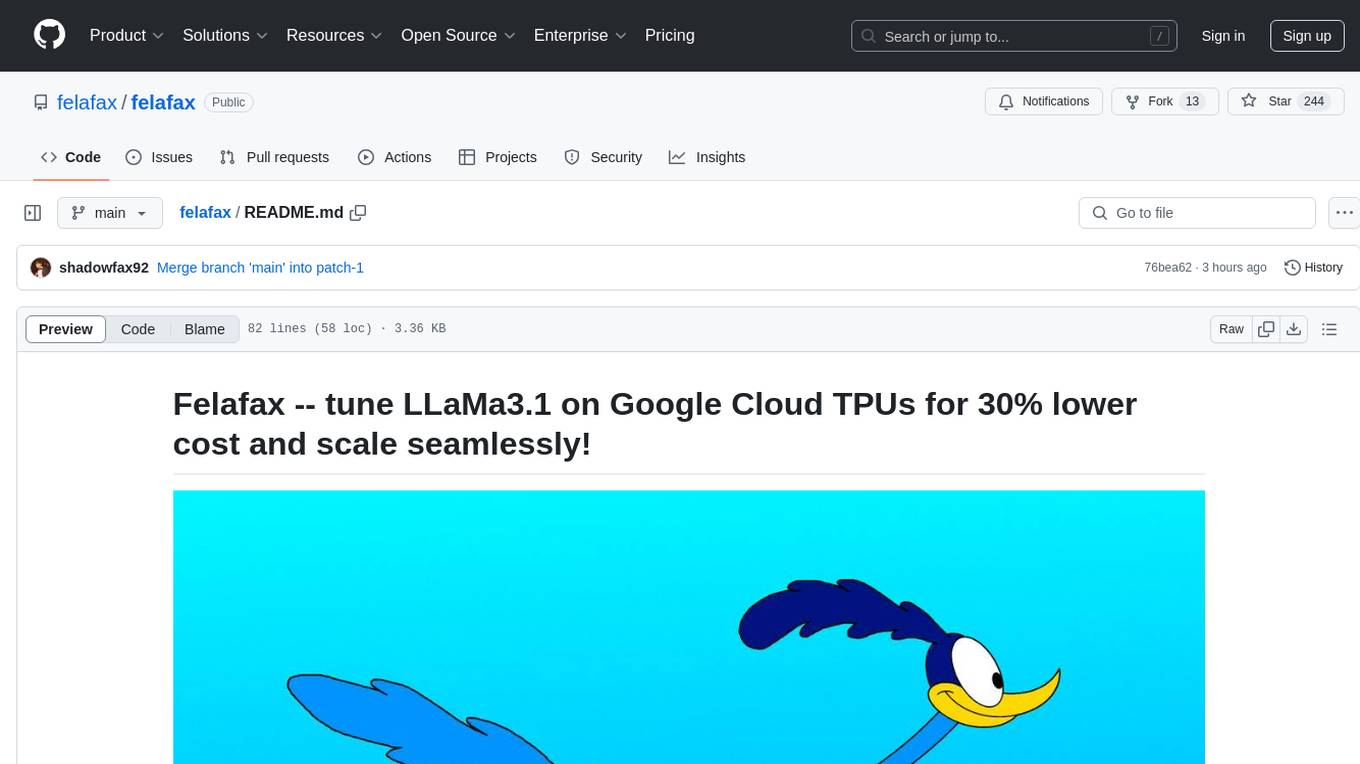
felafax
Felafax is a framework designed to tune LLaMa3.1 on Google Cloud TPUs for cost efficiency and seamless scaling. It provides a Jupyter notebook for continued-training and fine-tuning open source LLMs using XLA runtime. The goal of Felafax is to simplify running AI workloads on non-NVIDIA hardware such as TPUs, AWS Trainium, AMD GPU, and Intel GPU. It supports various models like LLaMa-3.1 JAX Implementation, LLaMa-3/3.1 PyTorch XLA, and Gemma2 Models optimized for Cloud TPUs with full-precision training support.

apo
AutoPilot Observability (APO) is an out-of-the-box observability platform that provides one-click installation and ready-to-use capabilities. APO's OneAgent supports one-click configuration-free installation of Tracing probes, collects application fault scene logs, infrastructure metrics, network metrics of applications and downstream dependencies, and Kubernetes events. It supports collecting causality metrics based on eBPF implementation. APO integrates OpenTelemetry probes, otel-collector, Jaeger, ClickHouse, and VictoriaMetrics, reducing user configuration work. APO innovatively integrates eBPF technology with the OpenTelemetry ecosystem, significantly reducing data storage volume. It offers guided troubleshooting using eBPF technology to assist users in pinpointing fault causes on a single page.
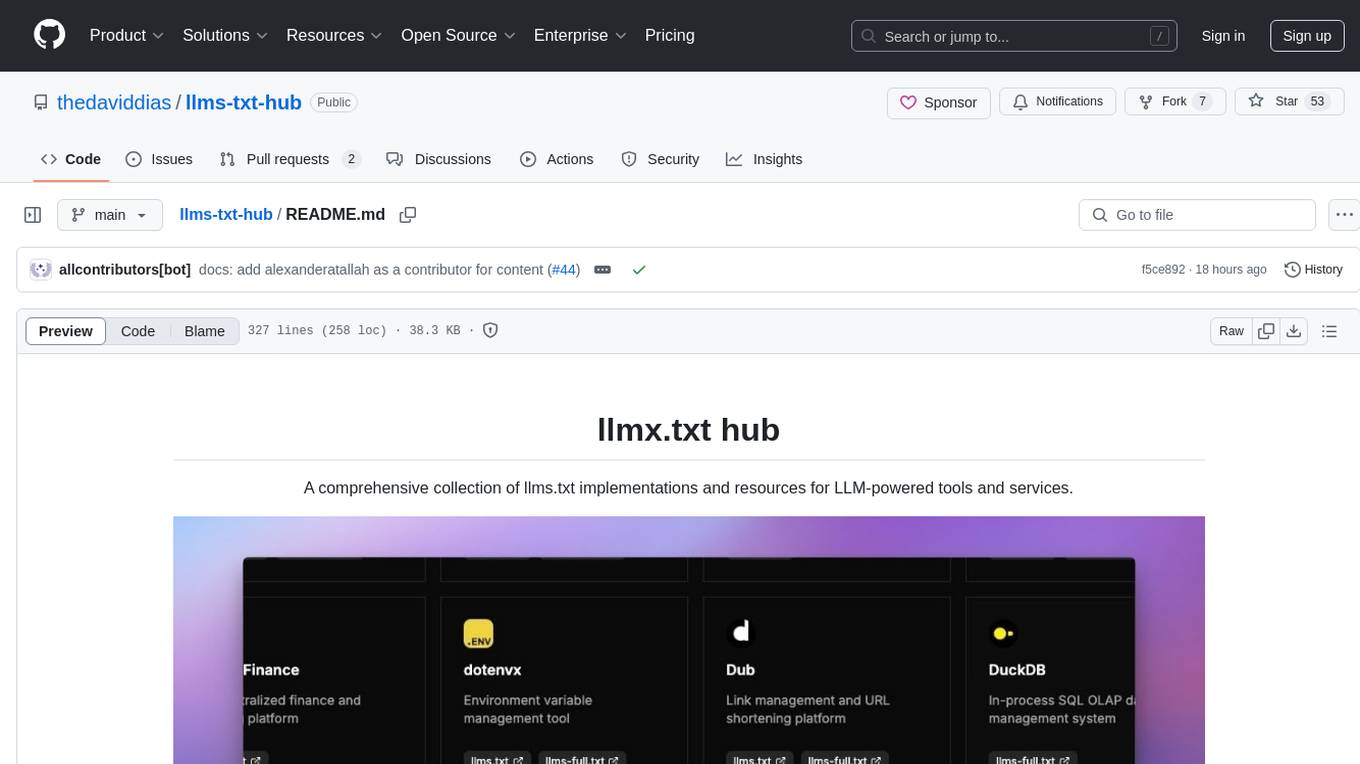
llms-txt-hub
The llms.txt hub is a centralized repository for llms.txt implementations and resources, facilitating interactions between LLM-powered tools and services with documentation and codebases. It standardizes documentation access, enhances AI model interpretation, improves AI response accuracy, and sets boundaries for AI content interaction across various projects and platforms.
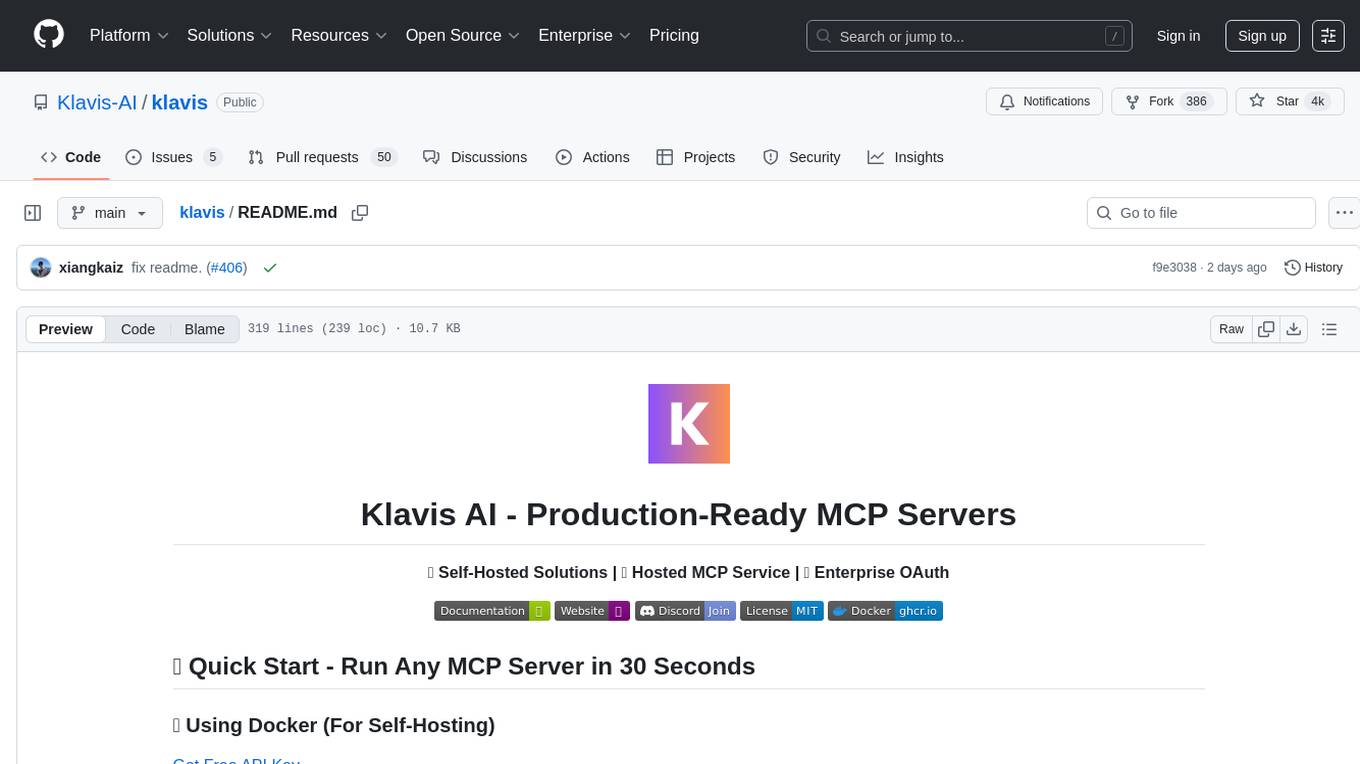
klavis
Klavis AI is a production-ready solution for managing Multiple Communication Protocol (MCP) servers. It offers self-hosted solutions and a hosted service with enterprise OAuth support. With Klavis AI, users can easily deploy and manage over 50 MCP servers for various services like GitHub, Gmail, Google Sheets, YouTube, Slack, and more. The tool provides instant access to MCP servers, seamless authentication, and integration with AI frameworks, making it ideal for individuals and businesses looking to streamline their communication and data management workflows.

kaito
Kaito is an operator that automates the AI/ML inference model deployment in a Kubernetes cluster. It manages large model files using container images, avoids tuning deployment parameters to fit GPU hardware by providing preset configurations, auto-provisions GPU nodes based on model requirements, and hosts large model images in the public Microsoft Container Registry (MCR) if the license allows. Using Kaito, the workflow of onboarding large AI inference models in Kubernetes is largely simplified.

ai-on-gke
This repository contains assets related to AI/ML workloads on Google Kubernetes Engine (GKE). Run optimized AI/ML workloads with Google Kubernetes Engine (GKE) platform orchestration capabilities. A robust AI/ML platform considers the following layers: Infrastructure orchestration that support GPUs and TPUs for training and serving workloads at scale Flexible integration with distributed computing and data processing frameworks Support for multiple teams on the same infrastructure to maximize utilization of resources

tidb
TiDB is an open-source distributed SQL database that supports Hybrid Transactional and Analytical Processing (HTAP) workloads. It is MySQL compatible and features horizontal scalability, strong consistency, and high availability.

nvidia_gpu_exporter
Nvidia GPU exporter for prometheus, using `nvidia-smi` binary to gather metrics.





